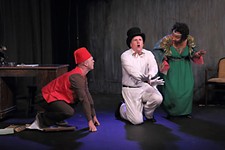Post-Oedipus
An ironic modern spin on Oedipus' tragedy, as seen through his wife's eyes
Reviewed by Barry Pineo, Fri., April 9, 2010

Post-Oedipus
Blue Theatre,
916 Springdale,
Through April 11
Running time: 2 hr., 10 min.
Ah, the house of Cadmus. It isn't so much a family tree as a family branch. And it's so tempting to go into every detail, but here's the bare silhouette: A son kills his father, marries his mother, has children with her, brings a plague upon his city. Discovers that he himself is the source of the plague. Blinds himself. Is exiled.
Which brings us to the point of departure for this Steven Gridley play. Few names in Western literature conjure up darker feelings than the name of the son, Oedipus, and while Oedipus, red-robed and blood-soaked, a stained white rag tied around his eyes, appears in this Blue Theatre and Getalong Gang Performance Group co-production, Gridley's version of the story really belongs to the mother, Jocasta. She is the first person we see, and she both mourns and glorifies her fate. In an extended sequence in which her physical position onstage contrasts almost perfectly with images projected behind her, she studies her pain, turns and shows it to us, and memorializes it by having a messenger come and take additional pictures. Throughout the course of the play, she insists on events happening in a certain way and always gets what she wants. It's almost as if the play is her vision of her pain, seen through the dual lenses of past and present.
It makes for an interesting family portrait, and director Spencer Driggers is especially lucky to have designer Stephen Pruitt to provide the perfect stark, multilevel setting, dominated by a rebar tree whose branches extend seemingly everywhere. Driggers is equally lucky to have choreographer Zenobia Taylor, who provides exquisitely appropriate movement throughout, especially when the Messenger, played by Helyn Rain Messenger (yes, that is her real name), stands behind Jocasta and speaks and moves for her. But Driggers is perhaps luckiest to have Jennifer Gravenstein playing Jocasta. "Over-the-top" unfortunately has negative connotations in performing circles, but certain roles lend themselves to it, even require it, and if ever a role did, that role is Gridley's version of this queen. From beginning to end, Jocasta must mourn. Not only must she mourn, grieve, and bewail her fate, she must do it all while being conscious of the fact that she does it. Sounds kind of crazy, doesn't it? In Gravenstein's hands, it doesn't look crazy. It looks open, kind. Joyful, even. Which makes it all the more sad and all the more horrifying.
Not all of the actors get the style equally well, but at least they all go after it. James Brownlee stands out as Oedipus, who builds a giant gumball machine and listens to self-improvement tapes. And if you can now conjure the image of a man dressed in bloody rags listening to self-improvement tapes, the overwhelming irony in Gridley's play will become apparent. Ironic also that Jocasta would actually want to mourn the end of the cursed house of Cadmus. Ironic that she would be aware of the fact that she is doing so. Ironic that we have continued to do exactly as she since this story first was told.










